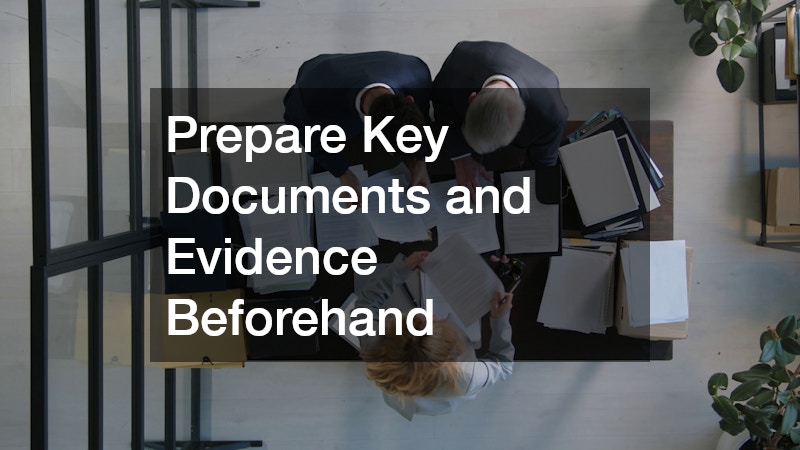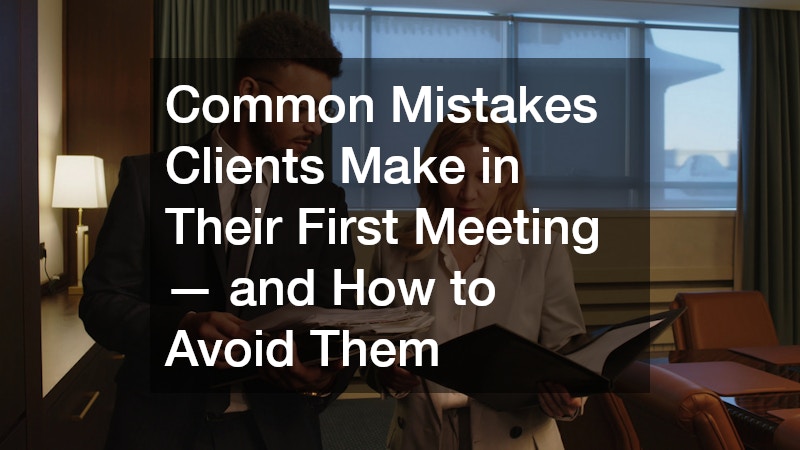
Meeting a lawyer for the first time can feel intimidating. Whether you’re facing a personal legal challenge, planning for your family’s future, or exploring your rights after an unexpected event, understanding what to expect can make the process much smoother.
Your first consultation is a critical step — it sets the tone for your relationship with your attorney, establishes trust, and helps determine the next steps for your case. Many people arrive at that meeting uncertain about what will happen, what documents to bring, or how to communicate their concerns clearly.
This guide walks you through the entire process of a first legal consultation. You’ll learn what actually happens in that initial meeting, how to prepare effectively, what questions to ask, and how to make sure you leave feeling confident and informed.
Understand the Lawyer’s Role and the Purpose of the Consultation
The first meeting with a lawyer isn’t about winning your case on the spot — it’s about evaluation, understanding, and clarity. The attorney’s job is to listen carefully, gather the facts, and help you understand your legal options.
If you’ve been injured in an accident, for example, a personal injury law firm will focus on gathering information about how the incident occurred, who might be liable, and what evidence supports your claim. You can expect them to ask for details about medical treatment, witness statements, and insurance communications.
In contrast, a criminal defense attorney will approach the meeting from a different angle. They’ll want to understand the nature of the charges, the timeline of events, and whether you’ve already spoken with law enforcement. Their primary goal in that initial discussion is to protect your rights and begin assessing the strength of the case against you.
Across all areas of law, that first consultation is your opportunity to ask questions and gauge the lawyer’s experience, communication style, and professionalism. Think of it as a two-way conversation — not an interrogation — where both sides decide whether the fit is right.
Prepare Key Documents and Evidence Beforehand
Preparation is one of the most effective ways to make your first meeting productive. Arriving with the right documents and a clear summary of your situation helps the lawyer give accurate advice and reduces the need for follow-up clarification later.
For example, if you’re meeting with an estate planning lawyer, bring copies of existing wills, trusts, property deeds, and financial account statements. These materials help the attorney understand your current situation and suggest ways to organize or update your estate plan efficiently.
If your issue involves a recent arrest or DUI, a local drunk driving lawyer will need different materials. Police reports, test results, citations, and any correspondence from the court are essential to help them assess potential defenses.
In addition to documents, consider writing a short personal summary before the meeting. Outline what happened, when it happened, who was involved, and what outcome you hope to achieve. This preparation shows that you respect the lawyer’s time and ensures you don’t forget key details during the consultation.
Learn How Fees and Billing Are Discussed Upfront
One of the most important — and sometimes uncomfortable — parts of any legal meeting involves fees. A good lawyer will bring up the topic early to make sure you understand how billing works and what to expect.
Different types of cases often come with different billing structures. For instance, a divorce attorney typically charges an hourly rate and may require a retainer fee before starting work. They might also offer mediation services or unbundled legal assistance if you only need help with certain parts of your case.
A custody attorney may have a similar arrangement but could charge differently depending on the complexity of hearings or negotiations involved. Family law matters often evolve over time, so it’s worth asking how additional work or changes in strategy might affect your total cost.
Don’t hesitate to request a written explanation of billing practices, including hourly rates, retainer replenishment terms, and what expenses (like filing fees or expert witnesses) are billed separately. Transparent communication about costs helps prevent misunderstandings and builds trust from the start.
Expect to Discuss the Facts Honestly and Thoroughly
The first consultation is your chance to tell your story — truthfully and completely. Attorneys can only give sound advice based on accurate information. Holding back details, even those that seem embarrassing or irrelevant, can seriously harm your case later.
If you’re working with local attorneys, honesty is especially important because community connections and local knowledge often play a key role in how your matter is handled. Being open allows them to anticipate potential conflicts or procedural hurdles unique to your area.
Similarly, if you’re meeting with an assault attorney, transparency is essential. They need to know every detail — what happened before, during, and after the incident; whether there were witnesses; and how law enforcement responded. Even small inconsistencies can make a significant difference in building a strong defense.
Remember that the attorney-client privilege protects everything you share in confidence. Your lawyer cannot reveal what you discuss without your consent, so it’s in your best interest to be completely candid from the beginning.
Learn How Lawyers Evaluate the Strength of a Case
During your meeting, your lawyer will analyze the facts you’ve provided to assess the likelihood of success and possible strategies. This evaluation helps determine whether it makes sense to proceed, settle, or take alternative action.
When you meet with a personal injury lawyer, for example, they’ll review the details of the accident to determine liability and damages. They may ask about insurance coverage, medical treatment, and lost income to estimate potential compensation. They’ll also evaluate the evidence you’ve gathered — such as photographs, witness statements, and police reports — to gauge the strength of your claim.
In a business context, a client might bring in a franchise agreement for an FDD review (Franchise Disclosure Document review). In this situation, the lawyer examines the contract terms, obligations, and risks before the client signs. This process helps identify red flags, such as excessive fees or unfair termination clauses.
Regardless of the legal field, the attorney’s evaluation will be both factual and strategic. Take notes during this part of the meeting and ask follow-up questions about alternative outcomes, potential timelines, and what success realistically looks like.
Ask About Communication and Next Steps
Once you’ve discussed your case and reviewed initial impressions, the lawyer should explain what happens next. This conversation sets expectations and defines how the professional relationship will function moving forward.
Ask practical questions, such as:
- How often should I expect updates?
- Will I communicate directly with the lawyer or their assistant?
- What’s the best way to reach you — phone, email, or an online portal?
- What are the key deadlines I should know about?
Lawyers appreciate proactive clients who stay involved, but it’s equally important to understand boundaries and availability. Knowing how communication will flow prevents frustration and ensures that both parties stay informed throughout the process.
If you’re unsure about terminology or timelines, don’t hesitate to ask for clarification. A good attorney will welcome your questions and ensure you leave the meeting with a clear sense of direction.
Understand What You’re Signing Before You Leave
In many cases, the first consultation ends with the lawyer offering a formal engagement agreement or retainer contract. This document outlines the scope of representation, fee arrangements, and mutual responsibilities.
Before signing, take time to read every section carefully. Make sure you understand the terms related to billing, case management, and termination of services. If something is unclear, ask for an explanation in plain language. You are entitled to know exactly what you’re agreeing to.
If you feel uncertain or pressured, it’s perfectly acceptable to take the agreement home and review it at your own pace. You may even want to compare it with another firm’s proposal before making your decision. A trustworthy lawyer will respect your need to make an informed choice.
Common Mistakes Clients Make in Their First Meeting — and How to Avoid Them
Even with the best intentions, first-time clients often make simple mistakes that can hurt their cases or waste valuable time. Being aware of these pitfalls in advance can help you avoid them and ensure your first meeting is as efficient and informative as possible. Treat the consultation as a partnership — preparation and openness go a long way toward helping your lawyer help you.
Arriving Unprepared
Forgetting documents or important details can delay your case. Always double-check your file before leaving home. Bringing copies of everything — even items you’re unsure are relevant — allows your attorney to review all possible angles right away and saves time during follow-up meetings.
Withholding Information
Some clients omit facts out of embarrassment or fear of judgment. Remember — your lawyer isn’t there to judge you; they’re there to protect you. Concealing information can backfire later, so be forthcoming even about details that seem small or uncomfortable. Complete honesty helps your attorney build the strongest, most accurate strategy for your situation.
Focusing Only on Price
Cost is important, but the cheapest option isn’t always the best. Consider experience, communication, and trustworthiness before making a decision. A slightly higher rate can be worthwhile if it means better service, quicker responses, or greater expertise in your specific type of case. Think of legal representation as an investment in achieving the right outcome.
Not Asking Questions
A first meeting should be a dialogue. Write down your questions beforehand and bring them with you. Asking for clarification on legal terms, processes, or timelines shows engagement and ensures you fully understand what to expect. The more you ask, the more confident you’ll feel moving forward.
Expecting Instant Results
Legal processes take time. The goal of this first meeting is to create a roadmap — not to solve everything in one sitting. Patience allows your lawyer to research, gather evidence, and build a thoughtful approach. Recognizing that legal success requires time and strategy will keep your expectations realistic and your case moving smoothly.
Avoiding these errors ensures your consultation is productive and sets the foundation for a strong working relationship. When both you and your attorney start on the same page, it becomes easier to collaborate, make informed decisions, and move toward a favorable resolution.
Maximizing the Value of Your First Consultation
Think of your first legal meeting as an investment in your future. To get the most value from it:
- Be on time and focused: Treat it like an important business appointment. Arriving a few minutes early allows you to gather your thoughts, review your notes, and start the meeting on a calm, professional note. Punctuality also shows respect for the attorney’s schedule and sets the right tone for your working relationship.
- Take notes: You’ll receive a lot of information, and writing it down helps you retain key points. Jotting down important terms, next steps, and deadlines ensures you have an accurate record of what was discussed, which can be especially helpful if you decide to consult another lawyer later for comparison.
- Be realistic: Ask for honest assessments, not guarantees. The law is complex, and no ethical lawyer can promise a specific result — but they can explain possible outcomes, challenges, and timelines. Understanding that early helps manage expectations and keeps the focus on strategy rather than speculation.
- Establish comfort: You should leave the meeting feeling that you can trust and communicate openly with your lawyer. A good attorney-client relationship is built on transparency and respect, so pay attention to whether the lawyer listens carefully, explains clearly, and makes you feel at ease discussing sensitive details.
A successful first consultation leaves you not only with legal insights but also with peace of mind. You should walk away understanding your options, your lawyer’s strategy, and the general timeline ahead.
Your first meeting with a lawyer can shape the entire course of your case. Preparation, honesty, and clear communication are the keys to making that meeting productive and reassuring. The more you understand about the process, the more confident you’ll feel when discussing your situation and making important decisions.
Every legal issue — whether it involves family, injury, business, or defense — begins with one conversation. Use that opportunity to build trust, gain clarity, and take the first step toward resolving your matter effectively. With the right preparation and mindset, your first consultation can set the tone for a professional, transparent, and successful attorney-client relationship.







